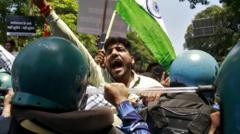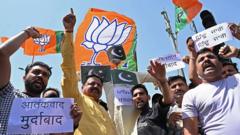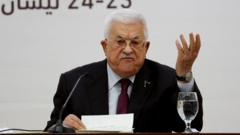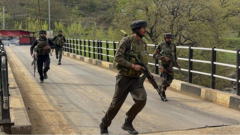In response to a brutal attack on tourists in Kashmir that left 26 dead, Pakistan has suspended visa services for Indians, closed airspace to Indian flights, and expelled diplomats, while India has taken similar measures against Pakistan. Police suspect the involvement of a Pakistan-based militant group in the attack, which has resulted in widespread detentions and further escalated hostilities in the region.
Rising Tensions in South Asia: Pakistan Halts Indian Visas Amid Kashmir Attack Fallout

Rising Tensions in South Asia: Pakistan Halts Indian Visas Amid Kashmir Attack Fallout
Pakistan suspends visas for Indian nationals and ramps up diplomatic measures following a deadly assault on tourists in Indian-administered Kashmir, leading to heightened tensions between the two nations.
Pakistan has announced immediate suspensions of visas for Indian citizens as part of a series of punitive measures following a militant attack in Kashmir that resulted in the tragic deaths of 26 tourists. This escalation comes amidst rising tensions between Islamabad and New Delhi, underscoring the fragile geopolitical climate in South Asia.
Notably, Islamabad's decision includes closing its airspace to flights operated by Indian-owned carriers and expelling several Indian diplomats. This retaliatory action follows accusations against Pakistan by India, as Indian police identified three gunmen linked to the attack, two of whom they claim are Pakistani nationals. The third suspect is reportedly a local Kashmiri man. Pakistan, for its part, has vehemently denied any involvement, asserting that the allegations lack credible evidence.
The attack occurred near Pahalgam, a popular tourist destination, and has prompted Indian Prime Minister Narendra Modi to affirm that India will relentlessly pursue any individuals or groups responsible for the violence. He declared that retribution awaits those who threaten India's sovereignty.
In a diplomatic tit-for-tat, India responded by suspending visas for Pakistani nationals and closing the Attari-Wagah border crossing, amplifying tensions further. Pakistan has also rejected India's suspension of the Indus Water Treaty, warning against any efforts to divert water from shared rivers, framing such actions as acts of war.
The cultural implications of the attack have been stark; following the incident, approximately 1,500 individuals across Kashmir have been detained for questioning, with students from Kashmir facing increased scrutiny and harassment in various parts of India, reflecting a troubling rise in communal tensions. Emotional farewells have been held across India for the victims, revealing the profound sorrow felt nationwide.
The attack, described by leaders in Jammu and Kashmir as "barbaric," has not only led to deep shock among the local populace but also raised fears of potential military escalation between India and Pakistan. Both countries now find themselves at a precarious crossroads, where the recent events could have far-reaching consequences for regional stability and peace efforts in the often volatile Kashmir region.





















